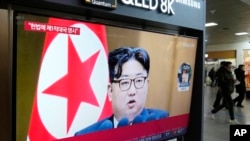The Biden administration has been making a diplomatic push for talks with North Korea with more explicit public proposals for engagement than at any other time since taking office.
“We want dialogue, and there are lots of valuable discussions” that could be had with the Democratic People’s Republic of Korea, or DPRK, said Jung Pak, the U.S. senior official for North Korea.
Those items for discussion could include sanctions, humanitarian cooperation and confidence-building measures, Pak said at a March 18 event hosted by the Center for Strategic and International Studies (CSIS) in Washington.
She added that the U.S. wants North Korea to take risk-reduction steps to avoid miscalculation and inadvertent escalation. The U.S. also wants to see Pyongyang take interim steps toward denuclearization, Pak said at another event held by the Carnegie Endowment for International Peace on March 5.
Joseph DeTrani, who served as the special envoy for six-party denuclearization talks with North Korea from 2003 to 2006 during the George W. Bush administration, told VOA via email on Friday that the Biden administration is making this approach now as opposed to earlier in its term because “tension on the Korean Peninsula has increased exponentially, and all efforts must be made to stop this escalation and defuse this tension.”
Since the beginning of the year, Pyongyang has repeatedly called Seoul its “primary foe” and denounced unification while rallying North Korea to prepare to occupy South Korea if a war breaks out.
North Korea has launched multiple rockets and cruise missiles and conducted several artillery firing drills this year. In its latest test on March 18, North Korea conducted a drill involving “newly equipped super-large multiple rocket launchers” that could cause “disastrous consequences” if a war breaks out, its state-run KCNA news agency said.
Since its term began in 2021, the Biden administration has said it is open to denuclearization talks with North Korea without preconditions. But it has been silent on what it would offer Pyongyang or how it thinks denuclearization should proceed, although it has hinted at incremental steps toward that goal.
After completing a monthslong policy review on North Korea in April 2021, then-White House spokesperson Jen Psaki said the Biden administration sought a middle ground between “a grand bargain” and “strategic patience.”
Former President Donald Trump sought to strike “a grand bargain” with North Korean leader Kim Jong Un.
Trump’s predecessor, former President Barack Obama, pursued a policy approach dubbed “strategic patience,” which involved waiting to engage Pyongyang until it reduced tensions.
In an interview with VOA on March 18, Pak said, “Our policy is the same since we rolled out our policy review back in the spring of 2021, which is that we are absolutely looking for the complete denuclearization of the Korean Peninsula.”
She continued, “When we talk about ‘interim steps,’ we’re making explicit what has always been implicit, which is a complete denuclearization will not occur overnight.”
Bruce Klingner, senior research fellow for Northeast Asia at the Heritage Foundation, told VOA in a telephone interview on Monday that “perhaps it was almost frustration” that prompted the Biden administration to make its approach to North Korea more explicit and public now.
U.S. officials “have tried many channels, including through third countries, trying to get messages to the North Koreans and indicating they’re willing to talk not only about denuclearization but about other nonnuclear issues, including risk reduction or confidence-building measures [and] humanitarian assistance,” Klingner said.
Mira Rapp-Hooper, special assistant to the president and senior director for East Asia and Oceania at the White House National Security Council, said at a CSIS-hosted virtual event on March 3 that North Korea “has not answered” multiple U.S. calls for dialogue made through “many channels.”
She continued, “This is increasingly problematic, of course, because we now see the DPRK taking increasingly escalatory behavior.”
Robert Rapson, who served as charge d’affaires and deputy chief of mission at the U.S. Embassy in Seoul from 2018 to 2021, said, “I was struck by the continued priority given ‘risk reduction’ as an initial discussion topic, which reflects, in my view, growing U.S. concerns about the escalatory situation on the Korean Peninsula.”
While North Korea increased missile launches and verbal hostilities toward South Korea, it has been making weapons shipments to Russia in defiance of international sanctions.
South Korean Defense Minister Shin Won-sik said at a press briefing on March 18 that Pyongyang has shipped about 7,000 containers of weapons to Russia since last year.
DeTrani said that is “all the more reason why we should be open and creative in getting North Korea back to negotiations.”
VOA State Department Bureau Chief Nike Ching contributed to this report.












